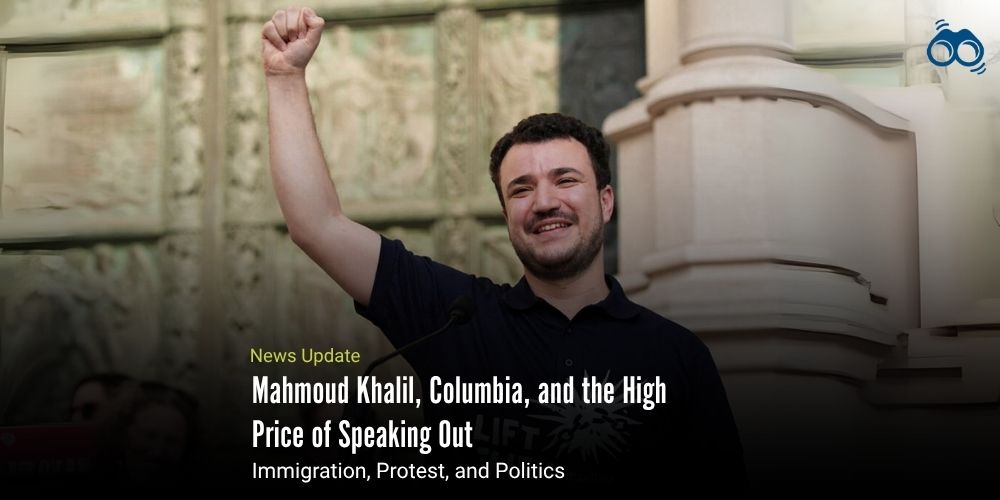Student Activist Faces Deportation Amid Federal Pressure on Elite U.S. Universities
Mahmoud Khalil’s Detention Highlights Government Crackdown on Pro-Palestinian Activism
In recent months, elite American universities have become flashpoints in a growing national debate over the limits of political expression, institutional autonomy, and the rights of non-citizen students. At the centre of this controversy is a sweeping federal crackdown on pro-Palestinian activism, an effort that has raised urgent concerns about the future of free speech and academic freedom in the United States. This campaign reached a critical turning point in March when federal immigration authorities arrested Mahmoud Khalil, a Palestinian student activist and Columbia University graduate, at his New York apartment. Widely seen as politically motivated, Khalil’s arrest marked the beginning of a broader Trump administration effort to suppress campus dissent, particularly targeting international students involved in pro-Palestinian organising.
During the three months Khalil spent in a Louisiana immigration detention centre, the administration escalated its actions. Several other international students were detained, and billions of dollars in federal research funding were pulled from universities like Columbia and Harvard, both of which had become epicentres of student activism. Khalil, already a prominent voice on campus, quickly became a central figure in the movement.
Speaking after his release, Khalil said he had no regrets, asserting that standing against what he described as genocide was something he firmly believed in. He was released on bail by U.S. District Judge Michael Farbiarz while he fights the government’s attempt to revoke his green card and deport him. Khalil returned to New York, where he was welcomed by U.S. Representative Alexandria Ocasio-Cortez at the airport. Supporters greeted him with Palestinian flags as he reunited with his wife, Dr. Noor Abdalla, a U.S. citizen and their newborn son, whose birth he had missed while in detention. Just two days later, Khalil addressed a rally near Columbia University, sharply criticising the institution’s leadership. A week later, he appeared before a cheering crowd alongside Zohran Mamdani, a pro-Palestinian state legislator and Democratic nominee in New York City’s 2025 mayoral race.
He explained that he had not chosen this path but had been forced into it by U.S. Immigration and Customs Enforcement (ICE). The experience, he said, had profoundly impacted his life. He missed his May graduation, was unemployed upon release, and lost a job offer from an international charity while in jail. With the government appealing his case, Khalil acknowledged the risk of re-detention and said his current priority is spending time with his wife and son.
Born in a Palestinian refugee camp in Syria, Khalil moved to New York in 2022 as a graduate student and soon became a leading organiser in campus protests. These demonstrations demanded that Columbia divest its $14 billion endowment from weapons manufacturers and companies linked to Israel’s military operations. Though not charged with any crime, Khalil now faces possible deportation under a rarely used immigration law. The government claims his lawful speech could harm U.S. foreign policy interests. However, the presiding judge has suggested that this argument likely violates Khalil’s constitutional right to free speech, a decision the government is currently appealing.
In response to criticism, White House spokesperson Abigail Jackson insisted the issue was not about free speech. She claimed it was about individuals who, in the government’s view, had no legal right to remain in the country and were allegedly siding with Hamas and leading protests that created unsafe conditions and harassed Jewish students. Khalil, however, condemned antisemitism and emphasised that Jewish students were integral to the protest movement. He argued that the government was using accusations of antisemitism as a political tool to reshape higher education—a move he linked to former President Trump’s criticism of universities as being dominated by anti-American, Marxist, and “radical left” ideologies.
He further stated that the Trump administration had threatened to withhold federal research funding, mostly biomedical, unless universities granted the government greater oversight of admissions, hiring, and curriculum, under the guise of promoting “intellectual diversity.” While Harvard pushed back against the funding cuts, Columbia reportedly complied with some of the administration’s demands, including stricter protest policies, as a condition for resuming negotiations.
Khalil described Columbia’s response as deeply disappointing, accusing the university of ceding control to the Trump administration. He claimed that the institution allowed political interference in the running of higher education. In contrast, Colombia maintained that protecting academic independence remained a firm red line. University spokesperson Virginia Lam Abrams said the institution respected the right of students, including Khalil, to express their views but stressed the importance of upholding campus policies to ensure a safe, inclusive environment for all.
Khalil called on Columbia and other targeted universities to listen to their students. He said students had proposed clear plans that upheld human rights, followed international law, and created inclusive spaces for all viewpoints. Instead, he argued, universities had chosen to bow to political pressure rather than engage meaningfully with their student communities. Khalil’s story ultimately underscores the growing tension between state power and campus activism, revealing how the struggle for rights, identity, and expression continues to shape the landscape of American higher education.
Editor’s Note
Mahmoud Khalil, a Palestinian student activist, is at the centre of a national discussion in the United States concerning free speech, immigration, and academic independence. His arrest and subsequent legal struggles underscore the challenges institutions and government policies face in managing dissent, particularly when it involves international students and politically charged subjects. Khalil’s case highlights the growing challenges for American universities, which are increasingly pressured to balance student activism and free expression with governmental demands. This situation underscores the critical need to safeguard open dialogue on campus as discussions around identity, activism, and freedom of expression intensify.
According to Skoobuzz, Mahmoud Khalil’s case stands as a powerful reminder that the intersection of political activism, immigration status, and institutional autonomy is not just a legal matter; it is a test of democratic resilience.














0 Comments (Please Login To Continue)